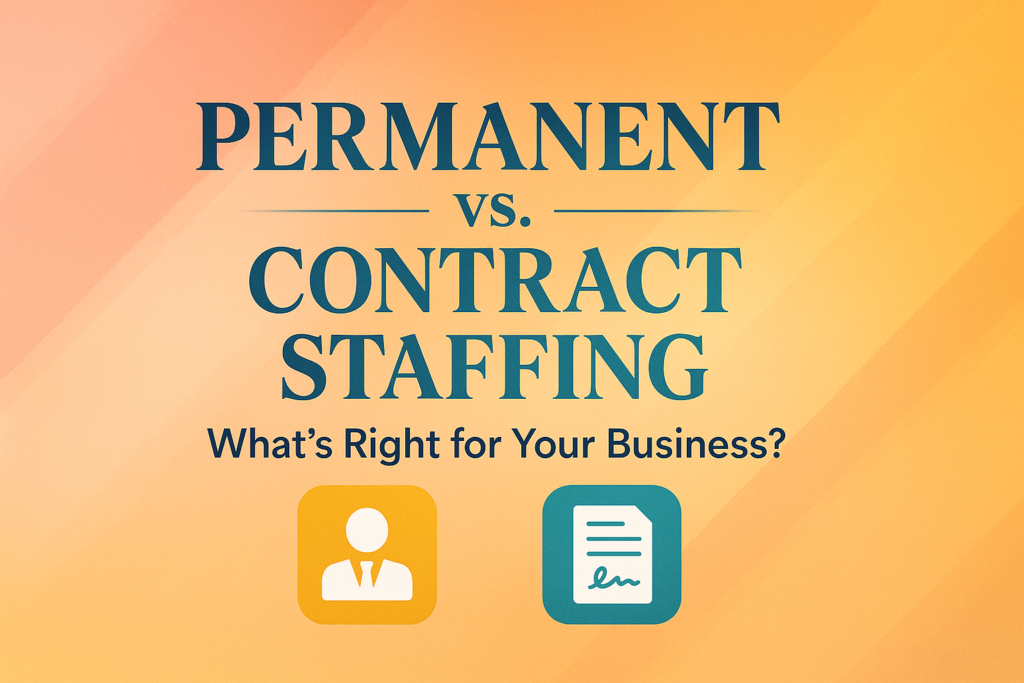Hiring the right talent is more than just filling a position; it’s about ensuring your workforce aligns with your company’s goals, growth plans, and operational needs. As businesses adapt to dynamic markets and digital transformation, the choice between permanent staffing and contract staffing becomes increasingly strategic.
Each staffing model has unique advantages, costs, and implications for workforce planning. In this comprehensive guide, we’ll dive into what each hiring model offers, when to use them, and how to determine the best approach for your business.
What is Permanent Staffing?
Permanent staffing refers to the employment of full-time or part-time employees who are hired directly onto a company’s payroll to build a long-term working relationship. These employees typically enjoy full employment benefits and become deeply embedded within the company culture.
Key Characteristics:
- The employment contract has no fixed end date.
- Employees are usually entitled to paid leave, bonuses, health insurance, retirement plans, and other statutory benefits.
- Job roles are often core to business functions and require in-depth training and onboarding.
- Employees participate in strategic planning, cross-functional collaboration, and long-term initiatives.
Business Advantages:
- Continuity and stability: Permanent employees offer consistent support, lowering the risk of high turnover.
- Cultural alignment: They often embody the company’s values, brand voice, and long-term vision.
- Loyalty and growth: With career development paths, training programs, and performance incentives, permanent staff are more likely to stay and evolve into future leaders.
- Deeper institutional knowledge: Long-term employees accumulate internal expertise that becomes a valuable asset.
Challenges:
- Higher cost structure: Salary, benefits, paid time off, severance, and long-term liabilities add to overhead.
- Limited flexibility: Hiring and terminating permanent staff is time-consuming and often bound by legal restrictions.
- Slower hiring cycle: Recruiting full-time talent takes longer due to more rigorous evaluation and onboarding processes.

What is Contract Staffing?
Contract staffing, also known as temporary or contingent staffing, involves hiring professionals for a fixed duration, project, or scope of work. These individuals may be sourced through a recruitment agency, a freelance platform, or directly from talent marketplaces.
Key Characteristics:
- Employment is limited to a specific period or deliverable.
- Workers may be independent contractors, freelancers, or agency-supplied temps.
- Roles are often skill-specific or operationally time-bound.
- Limited or no entitlement to full-time benefits or job security.
Business Advantages:
- Workforce flexibility: Easily scale up or down based on market demands, project lifecycles, or seasonal spikes.
- Reduced costs: Businesses save on employee benefits, training, insurance, and retirement contributions.
- Access to niche skills: Contract staff bring specialized knowledge for critical, short-term needs like software migration, audits, or product launches.
- Rapid deployment: Faster hiring timelines due to shorter vetting processes and a ready pool of available talent.
Challenges:
- Lower commitment: Contractors may not be invested in long-term outcomes or team-building.
- Limited integration: These employees may not be exposed to full company processes or internal dynamics.
- Risk of knowledge loss: Once a contract ends, valuable insight may leave with the individual unless knowledge transfer is documented.
- Legal and compliance risks: Misclassification or non-compliance with contract labor laws can lead to penalties.
When Should You Choose Permanent Staffing?
Permanent staffing is ideal for roles and situations that require continuity, team cohesion, and strategic input. It makes sense in the following scenarios:
- You’re building a long-term foundation : Hiring permanent employees for finance, operations, sales, or R&D ensures consistent decision-making and accountability.
- You want to nurture leadership:Permanent hires are candidates for career progression, succession planning, and cross-functional leadership roles.
- You have stable business operations: If your industry isn’t subject to frequent change, it makes sense to invest in people who will stay, grow, and innovate over time.
- Cultural strength matters: When employee loyalty, engagement, and retention are central to your brand, permanent staffing creates ambassadors who carry your company values.
When Should You Choose Contract Staffing?
Contract staffing is the preferred model in fast-paced, high-turnover, or skill-specific environments. It’s an effective strategy for:
- Project-based work : Launching a new mobile app, redesigning a website, or implementing a new CRM system? Contract professionals deliver fast and focused execution.
- Seasonal or temporary surges: Retail, hospitality, and logistics often require extra hands during holidays, product launches, or trade shows.
- Accessing hard-to-find skills: Need a blockchain developer, data security consultant, or SAP migration expert? Contracting gives you access to rare, in-demand expertise.
- Managing costs in uncertain markets: If your company is exploring new markets, piloting a product, or scaling cautiously, contract staffing limits long-term financial exposure.
Adopting a Hybrid Hiring Model
Modern companies rarely stick to one model. The most agile organizations use a hybrid staffing approach, combining permanent hires for core operations with contract workers for agility and innovation.
Benefits of a Blended Workforce:
- Resilience: You can quickly adapt to changing market demands.
- Optimization: Assign long-term talent to strategic functions while contracting specialists for time-sensitive goals.
- Efficiency: Lower fixed costs while still building in-house capability.
A recruitment partner with expertise in end-to-end recruitment solutions can help design and implement this hybrid approach seamlessly.
How to Decide the Right Model for Your Business?
When determining which staffing model works best for your company, consider the following factors:
- Project duration – Is this an ongoing need or time-bound?
- Skill availability – Can your internal team support this requirement?
- Budget flexibility – Can you afford long-term employee costs?
- Cultural impact – Is employee buy-in and team integration important?
- Legal/regulatory concerns – Are there restrictions around contract employment in your region?
You may also benefit from consulting a workforce strategist or partnering with a staffing firm that specializes in customized recruitment models.
Conclusion: Build Your Workforce with Purpose
Whether you choose permanent staffing, contract staffing, or a hybrid model, the goal remains the same: align your hiring approach with your business objectives. Permanent employees bring structure, continuity, and culture; contract workers provide speed, expertise, and adaptability.
In an era where the only constant is change, strategic workforce planning, powered by the right mix of employee types, can become your competitive advantage.
Let your recruitment strategy be proactive, not reactive. Whether you’re scaling fast or building for the long haul, the right hiring model will empower your business to thrive.
